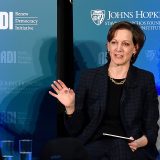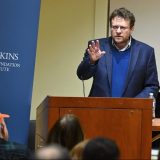We live in an era of digitally powered disinformation, social fracture and hyperpolarisation. Ukraine is on the frontline of this global crisis. A vast array of disinformation campaigns financed and promoted by the Kremlin, domestic oligarchs and other groups mean that popular perceptions and preferences in Ukraine are formed in a deeply distorted media environment. Historical narratives in particular are manipulated in order to polarise audiences, inspire hatred and stir discontent. The Russian state has used historical controversies around World War II as well as lingering nostalgia for the Soviet Union to set social groups in Ukraine against each other, to drive ethnic and geographical divisions and to undermine trust in pro-European reforms. These narratives paved the way for the invasion of Crimea and eastern Ukraine in 2014. Such weaponisation of history does not attempt to explore the past and establish truth, let alone achieve reconciliation or overcome trauma. Its aim is to cynically use historical narratives in an instrumentalised way as part of a military and “information war” that seeks to undermine Ukrainian statehood. Debunking manipulations of history is of course important, but if it is the only strategy, it also risks repeating and reinforcing the agenda and framing set by the Kremlin.
This project has explored the ways in which an independent, public service spirited media could create content about historical issues that avoids playing into propaganda-driven divides, fosters a more constructive discourse around history and brings Ukrainians into a common national conversation. The results of our project will also be of use to public diplomats, civic actors and educators, as well as to media outlets that share our aim of reducing polarisation in Ukraine and other countries, and building resilient societies with a full, free and evidence driven public debate.


